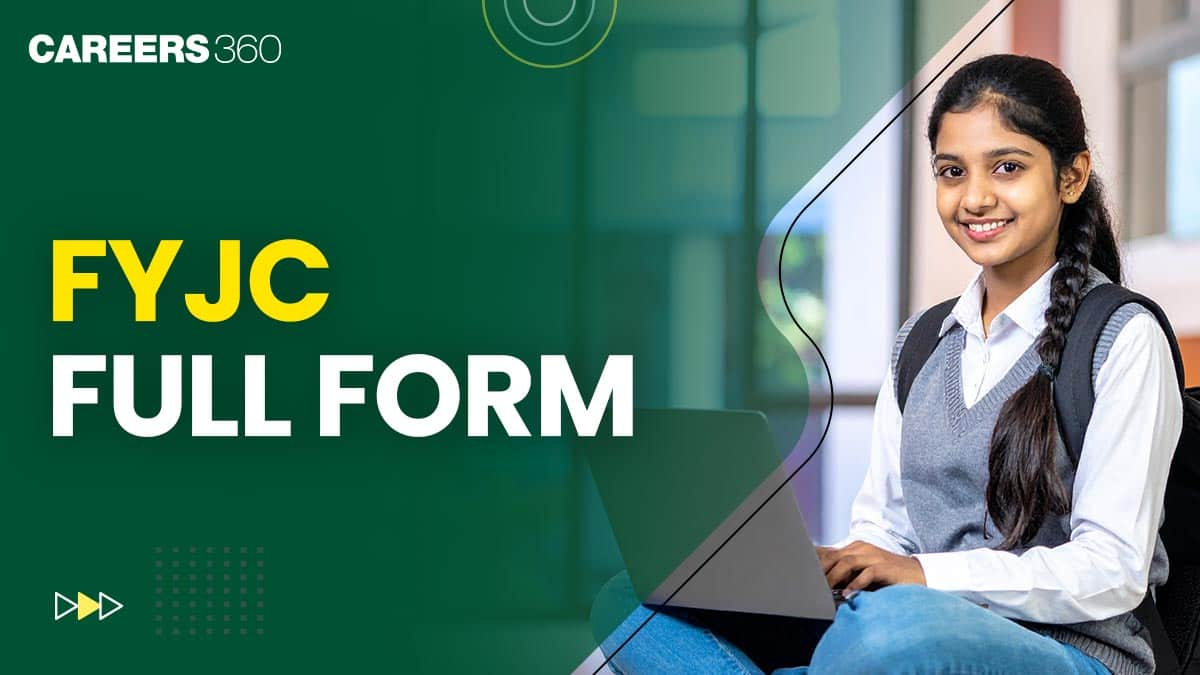FYJC Full Form: FYJC Variations, Course Details, Eligibility
FYJC refers to the First Year Junior College which means Class 11. It is a term more specifically used in the state of Maharashtra, India to refer to Class 11 or the first year of junior college. After Maharashtra board Class 10 result, students are admitted to junior college for two years (Class 11 and Class 12) before pursuing higher education at the undergraduate level. In junior college, students can choose science, commerce or arts stream. Read the article to know more about the FYJC below.
This Story also Contains
- What is FYJC?
- Variations and Other Terms for FYJC:
- Courses Offered in FYJC
- Schools/Colleges under FYJC

What is FYJC?
FYJC is the first year of post-secondary education. It is an important step for students before they join the university for further studies. In FYJC, students choose a stream between science, commerce and arts to focus on their future studies and careers. The students need to choose the appropriate stream because it works as a foundation for them. Below, we have explained a little more about the streams.
Science Stream: It includes subjects like Physics, Chemistry, Biology, and Mathematics. This stream is for students who are interested in pursuing careers in fields such as medicine, engineering, research etc.
Commerce Stream: The commerce stream is for students who are interested in financial management, marketing, entrepreneurship and economic principles. It Includes subjects like Economics, Accountancy, Business Studies, and Mathematics.
Arts/Humanities Stream: Students can study subjects like History, Political Science, Sociology, and Psychology. This stream is for students who are interested in fields like literature, languages, social sciences, or any other liberal arts discipline.
Variations and Other Terms for FYJC:
There are various variations and equivalent terms used in different regions and contexts in India, such as:
Higher Secondary Certificate (HSC): The FYJC is the beginning of the HSC course, it covers Class 11 and Class 12, two years of junior college. This two-year program ends with an important exam that plays a crucial role in university admissions and future educational opportunities.
Class XI: In many contexts, FYJC is simply referred to as Class XI or the 11th Class. This term is widely recognised across various educational boards and different parts of India.
Pre-University Course (PUC): In some states, such as Karnataka, FYJC is more commonly known as the 1st PUC.
Courses Offered in FYJC
First Year Junior College (FYJC) offers various courses/ streams for the students. Each and every stream has importance of its own and they are unique in their own way. After completing SSC or secondary education (Class 10), students can opt for any of the following streams that interest them and are offered in the FYJC. Below, we have provided streams and subjects that come under them. Students can get an idea of what they will have to cover after choosing the specific stream.
Science stream:
Physics: Physics cover topics like mechanics, thermodynamics, electromagnetism etc. It is the foundation for engineering and physical sciences.
Chemistry: It includes organic, inorganic and physical chemistry. This subject focuses on chemical reactions, bonding and the other properties of matter.
Biology: This subject is the study of living organisms including topics such as botany, zoology, genetics and human anatomy and physiology.
Mathematics: Maths cover algebra, trigonometry, calculus and statistics. It is important for scientific calculations and analysis.
Commerce stream:
Accountancy: Accountancy is the study of accounting principles, bookkeeping, financial statements and cost and management accounting.
Business Studies: It covers topics like business organisation, management, marketing, finance and entrepreneurship.
Economics: It focuses on microeconomics, macroeconomics and Indian economic development.
Mathematics: Similarly to science, students have the option of choosing mathematics as their subject in commerce streams. It will include algebra, calculus, statistics and their applications more towards in business and economics.
Arts/Humanities stream:
English literature: Students who are into studying literary works such as novels, plays, poetry and literary criticism can opt for arts stream.
History: History like the name, covers ancient, medieval as well as modern Indian and world history.
Political science: It deals with the study of political systems, institutions, theories, international relations with other countries etc.
Economics: In arts, students get to study basic economic concepts and theories.
Psychology: This subject explores human behaviour, emotions, mental processes etc.
Schools/Colleges under FYJC
After completing Class 10, parents start looking for best schools and colleges for their children. Below, we have provided a list of schools to choose from which come under the FYJC.
- DAV Senior Secondary School, Chennai
- Ramakrishna Mission Vidyapith, Deoghar
- Sri Kumaran Children's Home School, Bangalore
- National Public School, Bangalore
- The Heritage School, Gurgaon
- Chinmaya International Residential School, Coimbatore
- Hindu Senior Secondary School, Chennai
- HAL Public School, Bangalore
- Lakshmipat Singhania Academy, Kolkata
- Jawahar Navodaya Vidyalaya, Alappuzha
- Kendriya Vidyalaya, Colaba, Mumbai
- Birla Vidya Niketan, Pilani
- Amity International School, Noida
Frequently Asked Questions (FAQs)
FYJC stands for First Year Junior College.
There are three streams out of which students can opt for anyone, they are science, commerce and arts depending on their interests.
If a student wants to choose science stream they will get to study subjects like biology, chemistry, physics and mathematics.
Applications for Admissions are open.
As per latest syllabus. Physics formulas, equations, & laws of class 11 & 12th chapters
JEE Main Important Chemistry formulas
Get nowAs per latest syllabus. Chemistry formulas, equations, & laws of class 11 & 12th chapters
JEE Main high scoring chapters and topics
Get nowAs per latest 2024 syllabus. Study 40% syllabus and score upto 100% marks in JEE
JEE Main Important Mathematics Formulas
Get nowAs per latest syllabus. Maths formulas, equations, & theorems of class 11 & 12th chapters
